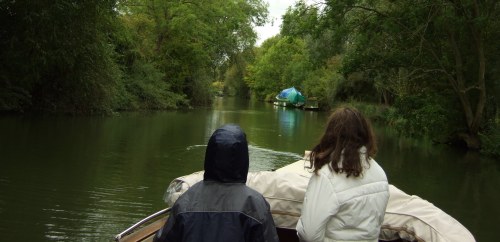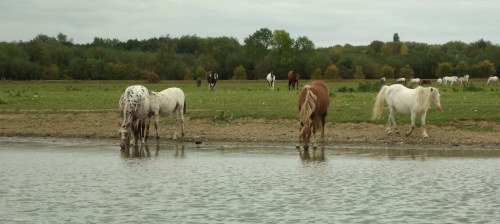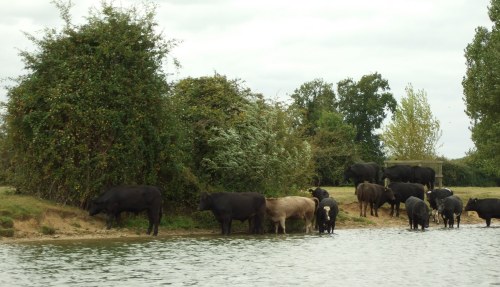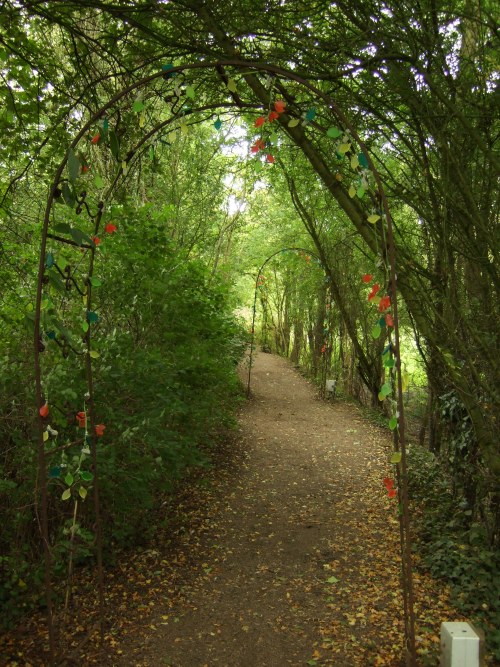28 September 2009
Met Vanessa St. Clair, the likeable great-granddaughter of "Alice" She has a remarkably direct link with the past, because both her mother and her grandfather had children very late in life, and so her mother actually met Alice Liddell.
She was too young to ask her the kind of penetrating questions I'd have asked, alas, but remembers Alice as having been stern and strict. I found it interesting that Alice, despite the sternness, seems to have doted upon her in private.
It's an attitude I have come across again and again in my readng of Victorian texts. There seemed to be an idea that making too much of children would turn their heads and make them conceited and "spoiled"; it must have drained so much warmth and happiness out of life. Even Carroll, who was usually totally on the children's side, used to think that too much attention and praise was bad for their social development.
Perhaps it is. I was at a magic show not long ago and a boy of about 11 was interrupting the performer with endless stupid, unfunny remarks. The first one got a laugh, the subsequent ones didn't. His parents were beaming with pride at every word, as the audience sighed and grimaced. Somehow the performer managed to avoid saying anything rude but if anyone had dared take a vote on whether to puncture the little horror's self esteem, I suspect it would have been carried overwhelmingly.
She was too young to ask her the kind of penetrating questions I'd have asked, alas, but remembers Alice as having been stern and strict. I found it interesting that Alice, despite the sternness, seems to have doted upon her in private.
It's an attitude I have come across again and again in my readng of Victorian texts. There seemed to be an idea that making too much of children would turn their heads and make them conceited and "spoiled"; it must have drained so much warmth and happiness out of life. Even Carroll, who was usually totally on the children's side, used to think that too much attention and praise was bad for their social development.
Perhaps it is. I was at a magic show not long ago and a boy of about 11 was interrupting the performer with endless stupid, unfunny remarks. The first one got a laugh, the subsequent ones didn't. His parents were beaming with pride at every word, as the audience sighed and grimaced. Somehow the performer managed to avoid saying anything rude but if anyone had dared take a vote on whether to puncture the little horror's self esteem, I suspect it would have been carried overwhelmingly.
19 September 2009

Researching an article for Smithsonian Magazine, I took Sid and Tashi along the river to Godstow from Oxford, the same route that Lewis Carroll took when he told the story of Alice in Wonderland. Puts Carroll's trip in a different perspective.
He and his friends must have been pretty fit. It's a good three hours solid rowing - we chickened out of that and had a boat with a motor. It was an electric motor, so it was almost as silent as rowing, but faster, and no doubt less healthy than rowing would have been. (Well, Victorians were used to exercise, right?)
But travelling in a smallish boat with kids made me see what a boon it would be to have a storyteller on board. They were trying very hard to be good, but after all a child has to do something! After they had leaned perilously over the edge to feed the ducks, pretended to kill all the alien cows with laser guns, tried spotting different kinds of wild animals, trailed ropes, etc. it was only too clear why Carroll's party played parlour games. I expect they stopped often along the way so the younger members of the party could run around. With a small boat, of course, you can do all kinds of exploring down side creeks.

It was dreamlike floating down the wide, pale and rather empty river, and some of the countryside along the way is traditionally managed in a fashion you don't often see now.

The commoners of Wolvercote still graze their sheep and cattle and there were scores if not hundreds of greylag geese congregated on the banks - like a wildlife film. The old hay fields at Godstow, are as full of marvellous wild flowers as they would have been in Carroll's day. Weeping willows trail over the water, cormorants and kingfishers flash to and fro.
This laid back boat trip made a startling contrast to the rest of the Oxford experience. I am not a huge fan of modern day Oxford. The colleges are jaw dropping but the city itself is too crowded, cycle-unfriendly. It bans cars but public transport is expensive and inconvenient. Much nicer to get out of all that hassle and drift backwards in time.

The Perch Inn, at Binsey, at which you can moor en route to Godstow, is well worth a stop. It's stylishly decorated but does have fairies and white rabbits amongst the flowers - managing to be pretty rather than twee.
You reach the pub through an enchanting series of rustic arches through the woodlands, twined about with little lights. A couple of Buddhist monks were enjoying their lunch there when we visited, which gave a slightly surreal air.
Our guide, Mark Davis, is a guide and waterways historian. As a Great Western Inter City screamed over a bridge across the river he pointed out that Carroll and the girls would have also seen the locomotives of the period chugging and roaring along. Perhaps the sight of them inspired the bit in Looking Glass about the curious railway journey.
You know, anyone who is interested in Lewis Carroll ought to do this trip. But the idea of even more kids going down the river ... hm.... !
